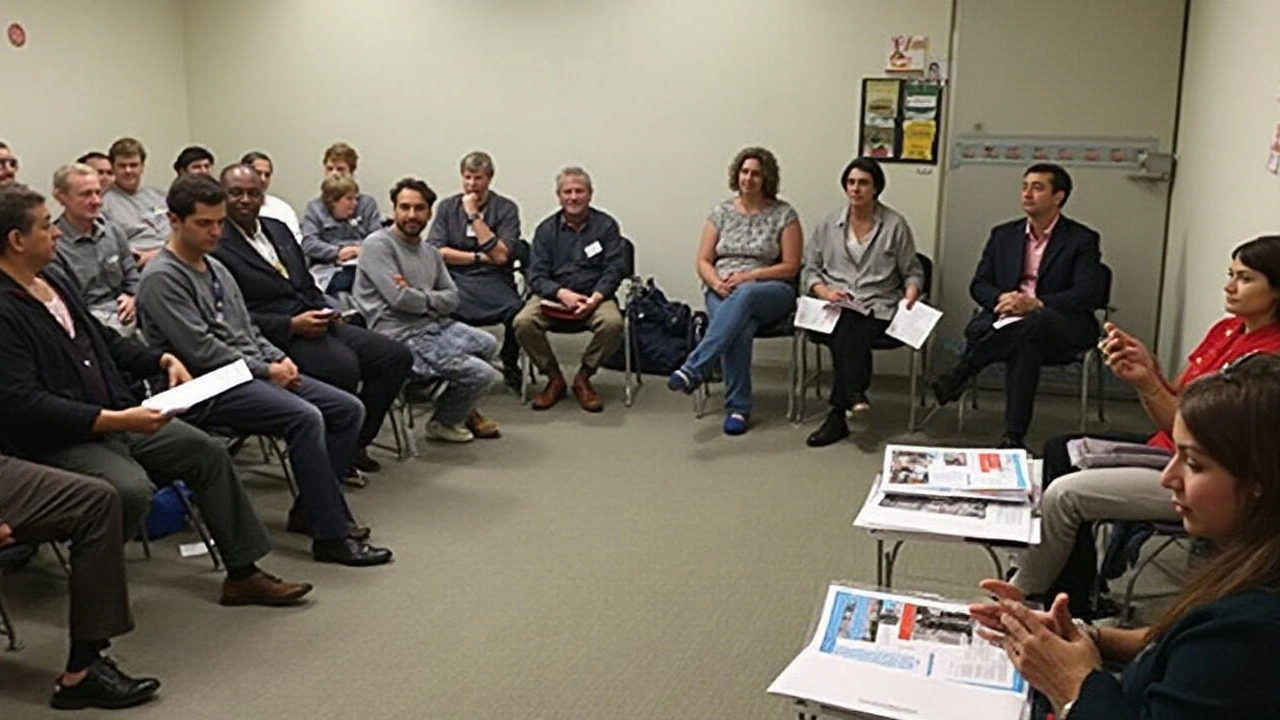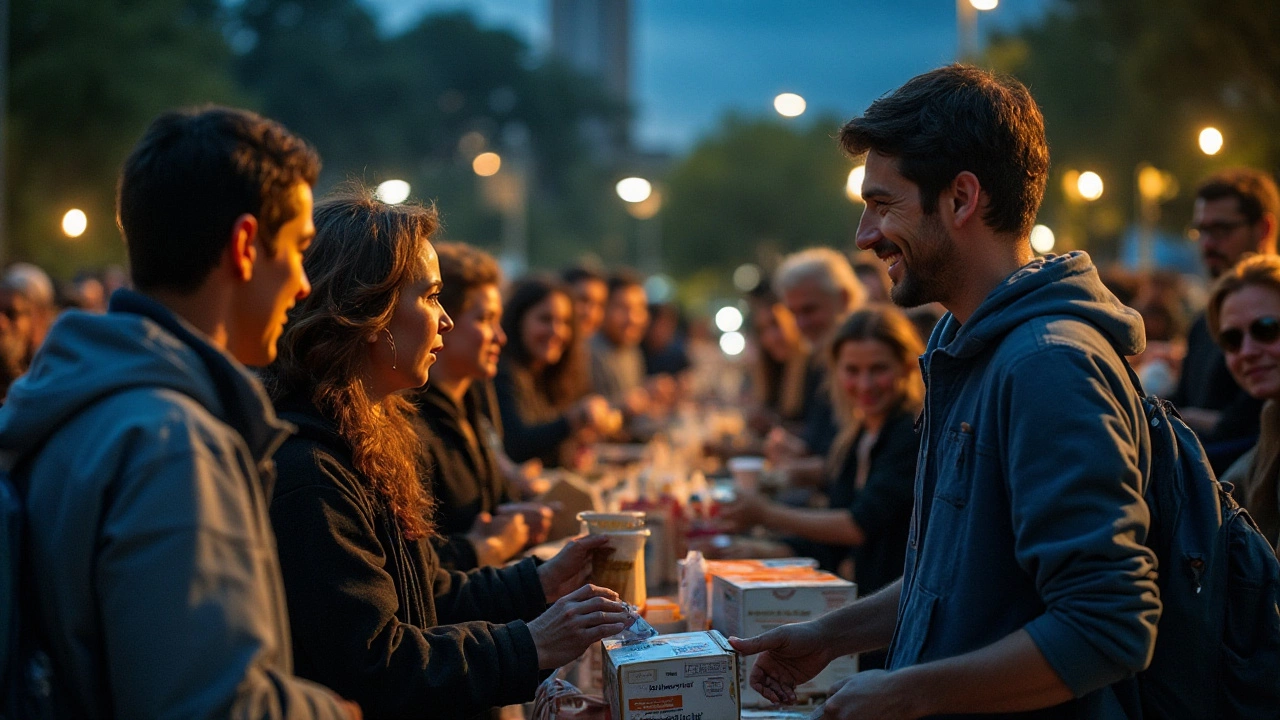In bustling cities like Houston, the sight of individuals assisting the homeless by offering meals is common. However, the question arises: is it legal to feed the homeless here? This seemingly straightforward act of kindness can be entangled in a web of ordinances, making folks pause before they help.
Diving into this issue requires more than a glance at local laws. It's essential to decipher why such regulations exist and what impact they have on the community and those wanting to lend a hand. If you're hoping to make a difference, understanding these rules and knowing the best ways to aid the homeless can lead to more impactful actions.
- Understanding the Legal Landscape
- Reasons Behind the Regulations
- How to Effectively Help
- Engaging with Local Organizations
Understanding the Legal Landscape
Delving into the legal landscape of feeding the homeless in Houston can initially seem daunting. However, it’s crucial for anyone wanting to make a positive impact to comprehend these complexities. Surprisingly, in some areas, distributing food to the homeless without adhering to specific regulations can lead to fines or other repercussions. This isn't universally the case, but a few key factors set Houston apart in terms of legal considerations. Understanding these can ensure that your intention to help aligns with the local laws while still contributing to community welfare.
For instance, a few years ago, Houston implemented the “Charitable Feeding Ordinance.” This law requires groups or individuals wishing to feed more than five homeless people at a time to obtain permission from the property owner. Additionally, any meal providers are encouraged to adhere to food safety standards akin to those followed by restaurants. Though these stipulations may appear cumbersome to some, they were designed to ensure the safety and well-being of the vulnerable populations receiving aid.
A significant motive behind such regulations is to maintain public health and sanitation. By having provisions regarding where and how food distribution can occur, the city seeks to mitigate the risks of foodborne illnesses and ensure safe consumption. Safety concerns are paramount, hence the necessity of rules that govern food handling during voluntary feeding programs. Despite the seemingly bureaucratic nature of these actions, they hold significance for the recipients’ health.
Houston homelessness has been a vivid image of urban challenges and city officials are tasked with balancing public safety, residents’ comfort, and the humanitarian need to support their unhoused neighbors. Debates surrounding this ordinance highlight varied perspectives. While many argue for revisiting these laws to allow more free-flowing charitable actions, others emphasize the need for rules that ensure consistent and quality support. According to a local report, the ordinance has sparked both advocacy and awareness about creative solutions for addressing homelessness. It represents an ongoing conversation of how best to marry compassion with mindful, organized aid efforts.
"Regulations around food distribution to the homeless aim to engage both compassion and responsibility," said a spokesperson from a local non-profit. "By understanding these laws, communities can work more effectively to address the needs of the homeless population."
One aspect not to be overlooked is how these legal stipulations impact not only those who want to lend a helping hand but also the non-profit organizations already established in Houston. Instead of dampening spirits, knowing the laws can actually channel charitable energies more strategically and into areas of most need. Legal requirements are part of this complex framework and can be embraced as a guide to doing meaningful work, rather than an obstacle to it. By engaging community support and adhering to these guidelines, individuals and larger entities can substantially contribute to improving the lives of Houston’s homeless.

Reasons Behind the Regulations
Feeding the homeless seems like a straightforward way of extending compassion, yet in Houston, as in many other cities, regulations are in place which may restrain such acts of kindness. These laws might seem harsh at first glance, but they are often rooted in what city officials believe to be practical community needs. Surprisingly, food-related activities can impact public safety, health, and urban environment more than one might guess. For instance, large unregulated food distributions can lead to unsanitary conditions, attracting pests and causing health hazards. This reality, though often overlooked, can quickly turn a good deed into a public health concern.
Moreover, feeding more than just a few individuals can inadvertently cause congestion and disrupt areas, especially in busy urban spaces. Without coordination among local shelters and soup kitchens, food donations might overlap or face wastage, defeating the intended purpose. It's also worth noting that many of these regulations aim to ensure that when help is provided, it is healthy and respectful of the people receiving aid. Local governments often strive to coordinate efforts with programs designed to provide more comprehensive support beyond meals, such as job placement and healthcare assistance.
Interestingly, Houston's approach reflects a broader trend across major cities to manage homelessness through structured, city-wide initiatives. A quote from the National Coalition for the Homeless highlights this balance:
"While food-sharing restrictions can seem draconian, they often signal a city's attempt to direct resources effectively, hoping not to perpetuate but to alleviate homelessness long-term."To ensure that these well-meaning efforts do not shift into counterproductive actions, thoughtful regulations are crafted to handle issues systematically, prioritizing health standards and equitable resource distribution.
Among the practical reasons, some suggest that these restrictions encourage people to engage in more structured forms of volunteering. This helps funnel efforts through organizations that not only provide meals but also connect individuals with essential services. It becomes a move towards holistic support — not just focusing on immediate needs like food, which could be coupled with homeless assistance programs offering long-term solutions. Bringing together community support through these regulatory frameworks can sometimes surprisingly increase the effectiveness of food-aid distributions and lead to more sustained impacts, something that every city hopes to achieve.

How to Effectively Help
When it comes to offering significant assistance to the homeless population in Houston, knowing where to start can make all the difference. It's crucial to realize that combating homelessness isn't simply about donating food or clothes; it’s about creating connections, ensuring dignity, and instilling hope. To make an impactful change, community members can begin by engaging in active dialogue with local homeless advocacy groups. These organizations often have detailed insights regarding the most pressing needs and efficient methods to deliver help, enabling individuals to contribute intentionally.
Understanding the systemic issues that contribute to homelessness is also critical. Many people hold the misconception that homelessness stems only from personal failure, but often, it's a result of complex challenges like poverty, mental illness, and addiction. By educating oneself and others about these issues, advocates can foster greater empathy and involvement within the community. Volunteering at shelters or joining initiatives that work on ending cyclical poverty can amplify the effectiveness of one’s efforts. Keeping abreast of local and national policies on homelessness through platforms like the National Coalition for the Homeless can also provide valuable insights.
Moreover, one can engage from the comfort of their own homes. Social media campaigns are powerful tools to spread awareness and gather support. Initiatives that encourage community involvement, such as organizing food drives or creating care packages, can lift the spirits while providing practical aid. Consider partnering with friends or colleagues to multiply efforts or challenge others to match contributions or volunteer hours to increase impact. Robert Egger, a renowned advocate for the fight against hunger, once remarked, "It’s not about moving mountains, but about small acts that, when combined, create an avalanche of change."
A direct approach many find meaningful involves reaching out personally to those in need. While adhering to local regulations, distributing essentials like blankets, socks, and hygiene kits can offer immediate relief. Engaging in conversation can also make a profound difference; sometimes, feeling seen and heard is as valuable as the physical support provided. Still, keep a respectful distance and ensure personal safety while doing so. Being consistent in actions rather than making a one-off gesture can foster genuine community trust and support.
If funds allow, consider contributing to reliable charitable organizations directly. Look for nonprofits with transparent financial reports and consider regular donations instead of one-time contributions to help sustain their initiatives. Crowdfunding platforms also offer opportunities to support specific projects or personal success stories of individuals transitioning out of homelessness, adding a personal connection to giving. Ultimately, the strength of compassion lies in its consistency and earnestness, ensuring every effort counts toward a brighter, inclusive future for all. Below is a table highlighting significant outcomes achieved by notable organizations in recent years.
| Organization | Initiatives | Impact |
|---|---|---|
| Coalition for the Homeless | Emergency Housing, Job Training | Rehoused 12,000 individuals in 2023 |
| Star of Hope Mission | Long-term Recovery, Youth Programs | Helped 1500 families achieve stable housing |

Engaging with Local Organizations
Tackling homeless assistance in Houston effectively often starts with collaborating with local organizations already embedded in the community. Countless non-profits and advocacy groups dedicate their efforts to providing resources, shelter, and meals to those without a home. These organizations often have deep insights into the needs of the homeless community and can guide newcomers looking to help. Working with such groups not only amplifies the impact of individual efforts but also ensures that those efforts are aligned with existing community needs and strategies.
When partnering with these organizations, it’s beneficial to understand their missions and methods. Each group might have a unique focus, be it temporary shelter, job placement assistance, or addressing the specific needs of families experiencing homelessness. For instance, SEARCH Homeless Services is renowned for its comprehensive approach that includes a mix of housing, employment services, and health care. Such organizations help integrate the homeless back into society, highlighting the importance of a multifaceted approach to address this complex issue.
Organizations like the Houston Food Bank play a vital role, too, by distributing meals throughout the city. They often seek volunteers to help in their kitchens or distribute food. Volunteering time can be as critical as donating money, as hands-on assistance helps these organizations scale their reach. According to a 2023 survey, volunteers contributed over 50,000 hours, significantly bolstering operational capabilities. This massive contribution reflects just how much community involvement can support an organization's mission beyond what donations alone could achieve.
For those looking to get involved, it might be beneficial to start by reaching out directly to these groups to see where help is most needed. Some may require help with administrative tasks, fundraising, or community outreach efforts. Larger organizations often have established volunteer programs with structured opportunities, while smaller grass-roots groups may be looking for help on an ad-hoc basis. Always consider attending orientation sessions or scheduled training to familiarize oneself with how the organization operates.
“By joining forces with local organizations, we can provide the support necessary not just to survive, but to thrive,” said a representative of one prominent Houston charity. That sentiment encapsulates the essence of why working together with these entities is crucial. Beyond the immediate impact, such collaborations paves the path for lasting societal change, demonstrating the power of collective action.As the homelessness issue is often intertwined with other societal challenges, engaging with organizations that have deep-rooted connections within the community can optimize assistance, ensuring efforts are impactful and sustainable over time.





